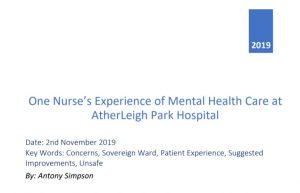| Back in September I had a fifteen day stay admitted in mental health ward. Unfortunately, the care that I received and the care I observed other patients receiving was unsafe and did not meet the high standards of care that I would expect from our National Health Service (NHS).
I am proud to be a Nurse and despite still being unwell I feel that it was important to raise the issues I experienced and observed to prevent future patients from experiencing the same. |
I never like to complain about anything, but even more so with our NHS. In fact I’ve never complained about anything in the NHS. I have nothing but love and adoration for our NHS, after all it has saved my life several times and the lives of my loved ones countless times. I know it’s not perfect, but I also know that most of the staff do the very best that they can with extremely limited resources.
But I felt that I had an ethical and professional duty to raise these concerns to ensure that I was acting within the Nursing & Midwifery Council’s Code of Conduct (2018). So I sat down with notes I made at the time and wrote an exposé report.
The purpose of this report was to raise issues/concerns and give suggested actions for improvements.
I started the report with the positives, like:
- The vast majority of staff introduced themselves to other patients and myself.
- Staff appeared to complete the appropriate paperwork.
- Staff wore the appropriate badges & tabards.
- But most importantly staff showed kindness and compassion.
Then I listed each issue or concern that I had along with suggested actions for improvement.
For example, a number of staff reported having “no idea” about diabetes. So I recommended:
- That all staff should receive training on diabetes that includes the difference between type 1 & 2 diabetes.
- All staff should be reminded that best practice is to take a BM reading before a meal and 2 hours after a meal.
- Staff should be reminded of any policies or procedures relating to diabetes care.
I then sent the report to the Complaints Team as a formal complaint, PALS, the Ward Manager (via PALS), the Lead Consultant Psychiatrist (via PALS), the Chief Executive, the Chief Nurse and Deputy Chief Executive and The Governance Team at my local Clinical Commissioning Group.
This was on a Saturday evening. I didn’t expect to hear anything until the following week. But I got an email back from the Chief Executive (on a Saturday!) thanking me for my report and assuring me that the Complaints Team would be in touch.
Since The Complaints Team have been in touch by email. It reads like they are taking my report extremely seriously which is good to read.
I’ll keep you updated.
Antony




